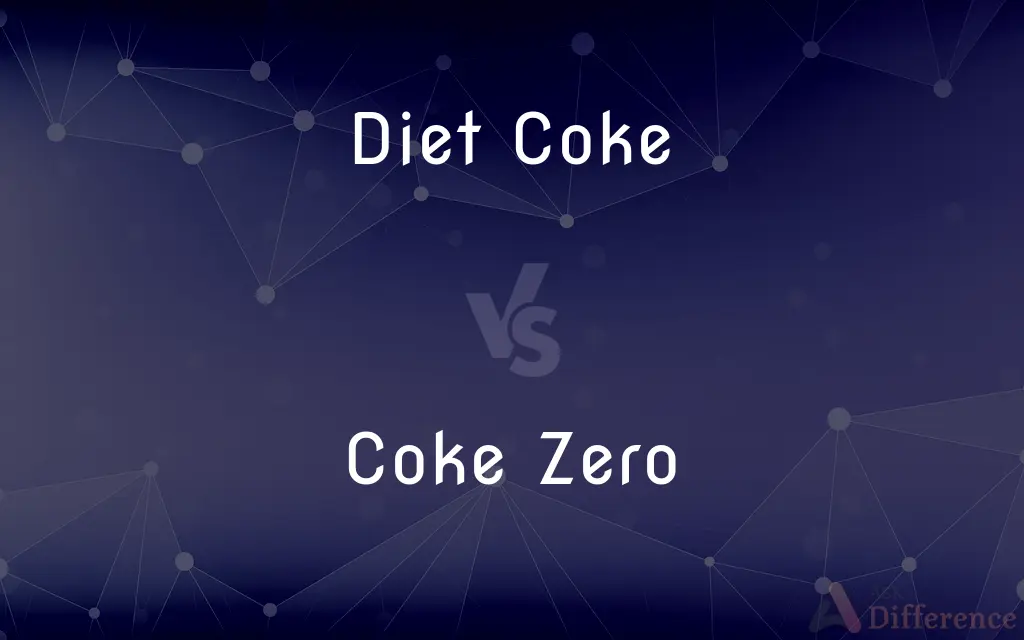Diet Coke vs. Coke Zero — What's the Difference?
By Tayyaba Rehman — Published on November 16, 2023
Diet Coke and Coke Zero are both zero-calorie colas, but they have distinct flavors due to different formulas.

Difference Between Diet Coke and Coke Zero
Table of Contents
ADVERTISEMENT
Key Differences
Diet Coke and Coke Zero, while both products of The Coca-Cola Company, cater to different taste preferences. Diet Coke, introduced in 1982, was the company's first sugar-free soda and is distinguished by its unique flavor profile. On the other hand, Coke Zero, launched in 2005, was crafted to taste more like the original Coca-Cola but without the sugar and calories.
Diet Coke and Coke Zero, despite having no calories, employ different artificial sweeteners in their recipes. Diet Coke is sweetened primarily with aspartame, which imparts its distinctive taste. Conversely, Coke Zero uses a combination of aspartame and acesulfame potassium, aiming to mimic the flavor of regular Coca-Cola more closely.
In terms of branding and marketing, Diet Coke and Coke Zero have been positioned differently. While Diet Coke has historically been marketed towards those looking for a lighter alternative to regular Coca-Cola, Coke Zero often appeals to a younger audience, emphasizing its zero sugar content alongside a taste comparable to the regular version.
From a visual perspective, Diet Coke and Coke Zero can be distinguished by their packaging. Diet Coke is often associated with a silver or white label, while Coke Zero traditionally features a black label. These distinct visual cues help consumers easily identify their preferred drink on store shelves.
Lastly, the names themselves reflect their branding strategies. Diet Coke suggests a diet-friendly option, emphasizing its reduced-calorie nature. In contrast, Coke Zero emphasizes the absence of sugar, driving home the point of zero sugar with its name.
ADVERTISEMENT
Comparison Chart
Launch Year
1982
2005
Sweeteners Used
Aspartame
Aspartame and acesulfame potassium
Flavor Profile
Unique flavor, different from Coca-Cola
Closer to the original Coca-Cola flavor
Target Audience
Those looking for a lighter alternative
Younger audience, emphasizing zero sugar content
Label Color
Silver or white
Black
Compare with Definitions
Diet Coke
A sugar-free cola introduced by The Coca-Cola Company in 1982.
Diet Coke became popular among those looking for a calorie-free soft drink.
Coke Zero
Coke Zero: Launched by The Coca-Cola Company in 2005.
Example: Coke Zero quickly gained popularity after its introduction.
Diet Coke
Often associated with silver or white labeling.
You can spot Diet Coke on the shelf by its signature silver can.
Coke Zero
Coke Zero: Emphasizes zero sugar content in its branding.
Example: Consumers appreciate Coke Zero for offering zero sugar with great taste.
Diet Coke
Known for its distinct flavor, different from regular Coca-Cola.
Some people prefer the specific taste of Diet Coke over other colas.
Coke Zero
Coke Zero: A zero-calorie cola designed to taste like regular Coca-Cola.
Example: Coke Zero appeals to those who want the Coca-Cola taste without the sugar.
Diet Coke
Sweetened primarily with aspartame.
The unique taste of Diet Coke is attributed to its aspartame content.
Coke Zero
Coke Zero: Uses a mix of aspartame and acesulfame potassium as sweeteners.
Example: The blend of sweeteners in Coke Zero gives it a flavor closer to the original.
Diet Coke
Marketed as a diet-friendly soda alternative.
Diet-conscious individuals often opt for Diet Coke.
Coke Zero
Coke Zero: Often recognized by its black labeling.
Example: The bold black label of Coke Zero stands out on the store shelves.
Common Curiosities
Do both drinks contain caffeine?
Yes, both Diet Coke and Coke Zero contain caffeine, though amounts may vary by region and formulation.
When were Diet Coke and Coke Zero introduced?
Diet Coke was introduced in 1982, while Coke Zero was launched in 2005.
Why does Coke Zero use two artificial sweeteners?
Coke Zero uses both aspartame and acesulfame potassium to closely mimic the flavor of regular Coca-Cola.
How do I differentiate between Diet Coke and Coke Zero based on packaging?
Diet Coke typically has a silver or white label, whereas Coke Zero has a black label.
Are Diet Coke and Coke Zero both calorie-free?
Yes, both Diet Coke and Coke Zero have zero calories.
Which of the two tastes more like the original Coca-Cola?
Coke Zero is crafted to taste more like the original Coca-Cola.
Have the formulas for Diet Coke or Coke Zero ever changed?
While the basic formula remains consistent, there have been variations or regional adjustments over the years.
What is the primary sweetener in Diet Coke?
Diet Coke is sweetened primarily with aspartame.
Are the ingredients in Diet Coke and Coke Zero safe for consumption?
Yes, the ingredients in both beverages have been deemed safe by food and health authorities.
Do Diet Coke and Coke Zero use real cola extract?
Yes, both beverages utilize cola extracts in their formulations.
Are there other variants of Diet Coke and Coke Zero available?
Yes, both brands have seen various flavor additions and limited-time variants over the years.
What sets apart the flavor profile of Coke Zero?
Coke Zero's combination of sweeteners aims to replicate the taste of regular Coca-Cola.
Does Diet Coke taste the same worldwide?
While the core flavor of Diet Coke is consistent, there may be slight variations based on regional preferences.
Is Coke Zero aimed at younger consumers?
Yes, Coke Zero often targets a younger audience emphasizing its zero sugar content.
Who is the target audience for Diet Coke?
Diet Coke has historically been marketed to those seeking a lighter soda alternative.
Share Your Discovery

Previous Comparison
Black Beans vs. Pinto Beans
Next Comparison
Permanent Magnet vs. Temporary MagnetAuthor Spotlight
Written by
Tayyaba RehmanTayyaba Rehman is a distinguished writer, currently serving as a primary contributor to askdifference.com. As a researcher in semantics and etymology, Tayyaba's passion for the complexity of languages and their distinctions has found a perfect home on the platform. Tayyaba delves into the intricacies of language, distinguishing between commonly confused words and phrases, thereby providing clarity for readers worldwide.













































